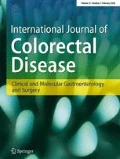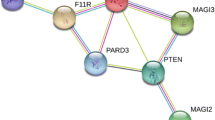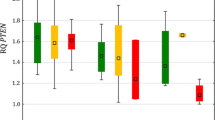Abstract
Purpose
Abnormalities of the solute-linked carrier family 26 member A3 (SLC26A3) are implicated in the pathogenesis of several diseases including ulcerative colitis (UC). The short communication aimed at investigating the associations of UC with SLC26A3 (rs17154444, rs7810937, rs7785539, rs2108225 and rs6951457) polymorphisms and its expression in colonic tissues.
Methods
The techniques of SNaPshot method, quantitative real-time PCR and immunohistochemical analysis were conducted.
Results and conclusion
We found that the rs2108225 variation in SLC26A3 might increase the risk of UC and affect its expression at both the mRNA and protein levels in colonic tissues of patients with UC. Moreover, the rs17154444 variation might influence the severity of UC.
Similar content being viewed by others
References
Xiao F, Juric M, Li J et al (2012) Loss of downregulated in adenoma (DRA) impairs mucosal HCO3(-) secretion in murine ileocolonic inflammation. Inflamm Bowel Dis 18(1):101–111. https://doi.org/10.1002/ibd.21744
Wojtal KA, Eloranta JJ, Hruz P (2009) Changes in mRNA expression levels of solute carrier transporters in inflammatory bowel disease patients. Drug Metab Dispos 37(9):1871–1877. https://doi.org/10.1124/dmd.109.027367
Ghishan FK, Kiela PR (2014) Epithelial transport in inflammatory bowel diseases. Inflamm Bowel Dis 20(6):1099–1109. https://doi.org/10.1097/MIB.0000000000000029.
Ishimori S, Kaito H, Matsunoshita N et al (2013) SLC26A3 gene analysis in patients with Bartter and Gitelman syndromes and the clinical characteristics of patients with unidentified mutations. Kobe J Med Sci 59(2):E36–E43. https://doi.org/10.1016/j.mam.2012.07.009
Hu D-y, Shao X-x, Xu C-l et al (2014) Associations of FUT2 and FUT3 gene polymorphisms with Crohn’s disease in Chinese patients. J Gastroenterol Hepatol 29(10):1778–1785. https://doi.org/10.1111/jgh.12599
Borenshtein D, Schlieper KA, Rickman BH et al (2009) Decreased expression of colonic Slc26a3 and carbonic anhydrase iv as a cause of fatal infectious diarrhea in mice. Infect Immun 77(9):3639–3650. https://doi.org/10.1128/IAI.00225-09
Asano K, Matsushita T, Umeno J et al (2009) A genome-wide association study identifies three new susceptibility loci for ulcerative colitis in the Japanese population. Nat Genet 41(12):1325–1329. https://doi.org/10.1038/ng.482
Asano K, Esaki M, Umeno J et al (2015) Contribution of susceptibility variants at FCGR2A and 13q12 to the risk of relapse among Japanese patients with ulcerative colitis. J Gastroenterol 50(11):1094–1102. https://doi.org/10.1007/s00535-015-1062-3
Yang SK, Jung Y, Kim H et al (2011) Association of FCGR2A, JAK2 or HNF4A variants with ulcerative colitis in Koreans. Dig Liver Dis 43(11):856–861. https://doi.org/10.1016/j.dld.2011.07.006
Liu JZ, van Sommeren S, Huang H et al (2015) Association analyses identify 38 susceptibility loci for inflammatory bowel disease and highlight shared genetic risk across populations. Nat Genet 47(9):979–986. https://doi.org/10.1038/ng.3359
Cleynen I, Boucher G, Jostins L et al (2016) Inherited determinants of Crohn’s disease and ulcerativecolitis phenotypes: a genetic association study. Lancet 387:156–167. https://doi.org/10.1016/S0140-6736(15)00465-1
Moyer RA, Wang D, Papp AC et al (2011) Intronic polymorphisms affecting alternative splicing of human dopamine D2 receptor are associated with cocaine abuse. Neuropsychopharmacology 36(4):753–762. https://doi.org/10.1038/npp.2010.208
Author information
Authors and Affiliations
Contributions
Xiao-xiao Shao, Dao-po Lin, Liang Sun, Chao-qun Wu, Wei Yang and Yi Jiang all met all the criteria for the definition of authorship and contributed substantially to the manuscript.
Corresponding author
Ethics declarations
Conflict of interest
The authors declare that they have no competing interests.
Rights and permissions
About this article
Cite this article
Shao, Xx., Lin, Dp., Sun, L. et al. Association of ulcerative colitis with solute-linked carrier family 26 member A3 gene polymorphisms and its expression in colonic tissues in Chinese patients. Int J Colorectal Dis 33, 1169–1172 (2018). https://doi.org/10.1007/s00384-018-3097-4
Accepted:
Published:
Issue Date:
DOI: https://doi.org/10.1007/s00384-018-3097-4




